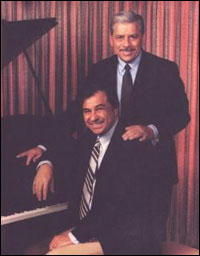
Together, the Sherman brothers composed such infectious, good-natured anthems as "A Spoonful of Sugar," "Let's Go Fly a Kite," "Step in Time," "Toots Sweet" and "Me Ol' Bamboo." The duo were particularly adept at nonsense lyrics. "Chitty Chitty Bang Bang" was a family's peppy anthem to an unusual car. "Chim Chim Cher-ee" was a chimney sweep's ode to good luck. And, though the sound of it was "something quite atrocious," thanks to the frères Sherman, everyone the world over knows how to say "Supercalifragilisticexpialidocious."
The Sherman brothers' chipper optimism suited their chief client, Disney, just fine. They, in fact, worked directly for Walt Disney himself until he died in 1966. For the movie studio, they wrote the scores of the animated films "The Jungle Book," "The Artistocats," "The Many Adventures of Winnie the Pooh," "Bedknobs and Broomsticks," as well as the Disney theme park theme song "It's a Small World (After All)," which was originally written for the 1964 World's Fair.
They also penned the scores for such non-Disney animated fare as "Charlotte's Web" and "Snoopy Come Home." If you don't know at least a half dozen Sherman songs by heart, there's a very good chance that you were never a child.
Late in life, the Shermans' two most famous projects, Mary Poppins and Chitty Chitty Bang Bang, were turned into blockbuster stage musicals. Both began in London's West End and later transferred to Broadway. The former, a collaboration between Disney and producer Cameron Mackintosh, continues to run at the New Amsterdam Theatre.
Their only previous Broadway experience had been the Tony Award-nominated 1974 World War II-set work Over Here!, which ran for a year. It was a follow-up to the Sherman brothers' earlier WWII musical Victory Canteen, a success Off-Broadway. Busker Alley, another Sherman brothers musical, failed to make it to New York, stalling in Florida in 1995 when star Tommy Tune broke his foot.
| |
 |
|
| Robert (standing) and Richard Sherman |
Mr. Sherman entered World War II at an early age, 17. On April 12, 1945, he was shot in the knee, forcing him to walk with a cane for the rest of his life. During his recuperation in England, he became interested in British culture, something that would come in handy later in his career.
In the late 1950s, the Sherman brothers began plying their father's trade, acting on a challenge from their father. They scored pop hits with "You're Sixteen," sung by Johnny Burnette, and "Tall Paul," sung by Annette Funicello. The latter attracted the attention of Walt Disney, who eventually hired the duo as staff songwriters for Disney Studios.
The brothers won two Academy Awards for "Mary Poppins," and were nominated seven more times. They also had four Grammy Award nominations (winning twice) and 23 gold and platinum albums.
He is survived by his brother Richard M. Sherman, and four children. His wife, Joyce Sasner, predeceased him in 2001.









